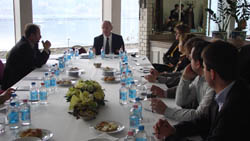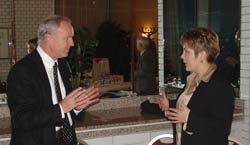Reka Fürtös and Matjaz Strmcnik of
 UNIS Vienna, in cooperation with the Hungarian Europe Society, organized a Round Table on 14 December 2005 in Budapest to commemorate the 60th anniversary of the United Nations and 50 years of Hungary in the UN. The purpose was also to raise awareness of government officials, NGO activists, media representatives and academia on the outcome document of the 2005 World Summit and post-World Summit developments of relevance to Hungary. In addition, the round table was designed as preparatory stage to a more substantive follow-up event (panel discussion, workshop, seminar) to be held in Hungary in the first quarter 2006. The meeting was chaired by Christian Holger Strohmann, O-i-C UNIS Vienna.
UNIS Vienna, in cooperation with the Hungarian Europe Society, organized a Round Table on 14 December 2005 in Budapest to commemorate the 60th anniversary of the United Nations and 50 years of Hungary in the UN. The purpose was also to raise awareness of government officials, NGO activists, media representatives and academia on the outcome document of the 2005 World Summit and post-World Summit developments of relevance to Hungary. In addition, the round table was designed as preparatory stage to a more substantive follow-up event (panel discussion, workshop, seminar) to be held in Hungary in the first quarter 2006. The meeting was chaired by Christian Holger Strohmann, O-i-C UNIS Vienna.
 The chairperson briefly recapitulated the main points of the Secretary-General's proposal toward development, security and human rights for all and then discussed results of the World Summit and the work that remains to be done. The inter-active presentation opened a lively discussion about various aspects of the United Nations activities and its impact on Hungary. A major observation by participants in the round table session was that any aspect of the UN's work remains abstract if people in Hungary cannot see implications and draw conclusions for their own country and themselves. Various target groups were identified to be addressed with selected topics according to their background and interest. In general, the Hungarian public seems to be not sensitized enough for United Nations affairs. In detail, the following topics/issues were mentioned to be considered in the planning of further awareness raising events in Hungary:
The chairperson briefly recapitulated the main points of the Secretary-General's proposal toward development, security and human rights for all and then discussed results of the World Summit and the work that remains to be done. The inter-active presentation opened a lively discussion about various aspects of the United Nations activities and its impact on Hungary. A major observation by participants in the round table session was that any aspect of the UN's work remains abstract if people in Hungary cannot see implications and draw conclusions for their own country and themselves. Various target groups were identified to be addressed with selected topics according to their background and interest. In general, the Hungarian public seems to be not sensitized enough for United Nations affairs. In detail, the following topics/issues were mentioned to be considered in the planning of further awareness raising events in Hungary:
- Role of international law in international/national conflicts incl. "responsibility to protect";
- Effectiveness of the International Criminal Court (ICC) The Hague and of the International Criminal Tribunal for the former Yugoslavia (ICTY) (Balkans subjects of special interest to Hungary; Carla DelPonte would be the preferred speaker;
- Effects of globalization on achievements of MDGs and the role of WTO (after Hong Kong);
- Strengthening collaboration between international organizations and NGOs, particularly UN and NGOs;
- Convincing people of the "human touch" of the UN, e.g. in promoting the respect for human rights and women's rights;
- Migrants, refugees and human rights;
- Increasing knowledge on the United Nations as standing task, starting from schools to universities, to media and the general public (need for joint activities of UNA with UN bodies);
- Trafficking in human beings and drugs, transnational organized crime and Hungary's role as transit country - role of customs office and of other executive forces;
- Why is there no progress on non-proliferation of nuclear weapons and disarmament? (ElBaradei as speaker requested);
- Corruption as major obstacle to development and socio-economic progress - how will the new anti-corruption convention address that problem? (Antonio Maria Costa as speaker requested);
- Workshop with "critical intelligencia" who are opinion leaders in blaming the UN for failure such as not preventing Rwanda, Bosnia, Iraq intervention, genocide in Dafur, mismanagement of oil-for-food programme...;
- Public speaking engagements of United Nations goodwill ambassadors (e.g. Julia Ormond) and of senior Hungarian United Nations officials such as Tibor Toth of CTBTO.
The Hungarian Europe Society agreed to collaborate with UNIS in facilitating further awareness raising events on above listed topics in 2006 and suggested as venue the Soros-Foundation sponsored Central European University. Preceding the round table UNIS staff met with the editor-in-chief of the news programme, the head of foreign news, the head of daily news and their staff of the major Hungarian TV station MTV. They expressed strong interest in various UN-TV productions from the UN audio-visual catalogue; in subscribing to UNIFEED; the Year in Review production and in video messages of the Secretary-General.